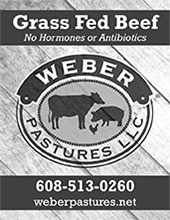 by Megan Minnick, Purchasing Director
by Megan Minnick, Purchasing Director
It’s no secret that eating locally through a Wisconsin winter is not an easy endeavor, especially when it comes to vegetables. Yes, there are some farms who are starting to grow spinach year-round in hoop-houses, and there are a smattering of local aquaponic and hydroponic farms popping up. Yes, some of us manage to squirrel away a portion of the summer’s bounty in our freezers or in canning jars, but in most cases, all of these things end up being delicious treats, carefully rationed through the long winter months.
Storage vegetables
There’s no getting around the fact that if you want to eat locally through a Wisconsin winter, you have to do what our pioneer ancestors did and look toward “storage” vegetables. These are veggies that are harvested in the fall and kept in root cellars or walk-in coolers through the winter: sweet potatoes, carrots, beets, winter squash, rutabaga, celeriac, turnips and others. These unglamourous vegetables provide the base of a locavore winter diet—something to be embellished by those frozen and canned preserves, or that precious winter spinach.
The hard truth is that there’s really only so much of these root vegetables one can eat before they become terribly boring. Yes, I said it—boring. As the winter drags on into February and March even the most talented cooks and dedicated locavores start to exhaust their appetite for vegetable stews, roasts, and salads.
Just like for the home cook, the life of a produce manager gets pretty static this time of year. We always have those same local winter root vegetables through the winter months, and there’s not a lot of excitement or change. Local food takes a backseat to the more exciting and vibrant fruits and veggies coming in from Mexico, California, and beyond.
Veggie noodles
That’s why I was so excited to get that first email from farmer Richard Olden of Olden Organics in Ripon, Wisconsin. He wrote me inquiring if Willy Street Co-op might be interested in purchasing a product he was just starting to develop: spiralized veggie noodles using his own locally grown veggies. I was intrigued. Instead of investing in hoophouses or greenhouses to try and grow more things through the winter like most farmers do, Richard and his wife Tracy made an investment in a certified organic kitchen where they planned to turn their home grown vegetables into veggie noodles and other fresh items that give new life and excitement to those boring old winter veggies. Genius!
What are veggie noodles you ask?
Spiralized veggie “noodles” are simply vegetables that are put through a machine that cuts them into long thin strands. These “noodles” can be sautéed, roasted, or boiled, and then used in almost any recipe that calls for pasta. It sounds a little crazy before you try it, but veggie noodles are delicious and really do serve as a nutritious, low-carb, gluten-free, local substitute for wheat-based pasta. We’re pleased to carry Olden Organics Red Beet, Butternut Squash, Sweet Potato, and Zucchini noodles in our Produce departments this winter. Because zucchini noodles are one of the most popular types of veggie noodles, Richard and Tracy have contracted with a farm in Florida to provide them with fresh zucchini through the off season (they’ll switch to their own zucchini as soon as they are ready in the summer). The beets, sweet potatoes, and butternut squash are all pulled from the Olden’s homegrown supply, and they are confident they’ll have enough of these storage vegetables to spiralize for us through the winter. If you want to get more adventurous, you can buy your own spiralizer (we sell several models) and spiralize almost any vegetable you can think of, and even some firm fruits like apples! What to do with spiralized veggies? Here are a few 100% local recipe ideas to get your imagination going!
Sweet Potato or Butternut Spaghetti
Pick up a jar of Willy Street Co-op 100% local diced tomatoes. Let them cook for several hours with local onions, garlic, and ground pork (optional) to make a simple marinara. Serve over sautéed or lightly boiled butternut or sweet potato noodles. Top with local Parmesan cheese.
Spinach and Beet Salad
Head to a winter farmer’s market to pick-up some local winter spinach. Top it with lightly sautéed red beet noodles and Roth Buttermilk blue cheese, some local hard-boiled eggs, and your favorite salad dressing.
Sweet Potato Mac and Cheese
Toss sautéed or lightly boiled sweet potato noodles with a simple homemade cheese sauce using Lonesome Stone milling flour (for the roux), Wisconsin butter, milk, and cheese.
Butternut Squash noodles with bacon and broccoli
Cook up some local bacon. Add butternut squash noodles and our own Willy Street Co-op 100% local frozen broccoli florets (available in the freezer aisle). Sprinkle with some local Parmesan cheese and serve!











